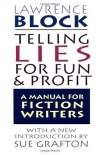Manual For Fiction Writers by Block, Lawrence (classic books to read .TXT) 📗

Book online «Manual For Fiction Writers by Block, Lawrence (classic books to read .TXT) 📗». Author Block, Lawrence
A case in point occurred a few years ago, when I came up with an excellent if incompletely formed idea for a book involving global intrigue during World War II. It wasn't really my kind of book, yet there was a lot of strength in the basic idea, so I talked about it with Brian Garfield and proposed it as a subject for collaboration. Brian happily agreed, and we discussed it some, and that was the end of that.
Except, of course, that it wasn't. Some years later I got a handle on another element of the plot, which made it an even stronger notion, though still not really my kind of thing. I talked it over with Brian and decided to go ahead with it alone, since as a collaboration it would never have gotten written. This way it did get written, but it turned out that it really and truly was not my kind of book, and what I wrote wasn't terribly good.
At which point it turned back into a collaboration, in this case with yet another writer, Harold King. This was his kind of book, and he liked a lot of what he saw in my first draft and had excellent ideas of his own to bring to bear upon it, so we talked it over and he went to work on the book. And it should finally make its appearance in the stores sometime during the fall or winter.
Finally, another project in which I'm currently engaged was done collaboratively not as a way of avoiding work but to avoid avoiding it. I'd been entertaining the idea of a guidebook to vegetarian and natural food restaurants for a while, but I doubt I'd have got anywhere with it if Cheryl Morrison and I had not entered into collaboration upon it. The problem with this book was that it would require little bits of work here and there over the course of a great many months. Because I would always have a primary project on the table, the guidebook would have been lost in the shuffle. And the same thing would have happened if Cheryl had undertaken the whole project herself.
As it stands, each of us feels an obligation to the other. Thus the work gets shared, and, a little at a time, it's getting done, largely because neither of us is prepared to let the other down.
I haven't tried to tell you how to collaborate. Indeed, on balance I'd probably advise you against trying it altogether, unless you really and truly feel you'll write more effectively as someone's partner. There have been any number of viable partnerships?Fern Michaels, Wade Miller, Manning Coles, Ellery Queen, Burdick and Lederer?but most of the time the desire to collaborate stems from the hope of making the process of fictional creation less lonely, and most of the time that just doesn't seem to be possible. The Concerto for Four Hands and Two Typewriters has its appeal, but for most of us writing is probably destined to remain a solitary occupation. Like dying, it seems to be something we have to do on our own.
CHAPTER 12
It Takes More Than Talent
IT CONTINUES to astonish me what a widespread and enduring fantasy Being a Writer is for the population at large. It's a rare day when I don't encounter some misguided chap who expresses the desire to trade places with me. And it's on those not-so-rare days when everything goes wrong, when the words won't come but the rejections fly thick and fast, when the bank account's gone dry again and editors don't even bother lying about the check's being in the mail, that otherwise sane folks tell me how much they envy me.
I wish I had your self-discipline, they'll say, generally saying so on a day when I've got the backbone of a threadworm. I envy you the imagination to keep coming up with ideas. Or they may envy me my education, which was an unremarkable one, or they'll say they wish they knew my formula for writing success, as though I had somehow unearthed an alchemist's secret for transmuting the dross of nouns and verbs into the shimmering gold of fiction.
Nobody ever says, I wish I had your talent.
And I find that fascinating. I don't think artists in other media get the same response. I doubt somehow that people kept grabbing. Picasso by the shoulder and telling him how they envied his self-discipline, standing in front of the easel day after day. I don't suppose Caruso had to listen to that kind of crap, either. Actors and singers in particular seem to be plagued by people who think talent is all there is to it, that they've been given a gift which allows them to stand up there in front of the microphone and show their stuff. The hours of training and practice, the essential will and tenacity, are somehow discounted.
With writing, it's the talent that's apt to be discounted. There are times when I tend to resent this. The unspoken premise in I wish I





Comments (0)